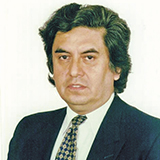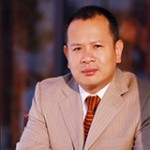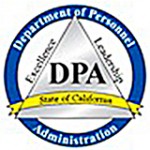Expert Interview – Ricardo Rodriguez-Ulloa, Principal Lecturer and Researcher – Strategic Management, Pontificia Universidad Católica, Perú
 For the report Performance Management in 2012, The KPI Institute conducted 12 semi-structured interviews with practitioners, academics and consultants, who offered a detailed image on the state of Performance Management as a discipline.
For the report Performance Management in 2012, The KPI Institute conducted 12 semi-structured interviews with practitioners, academics and consultants, who offered a detailed image on the state of Performance Management as a discipline.
Ricardo Rodriguez-Ulloa, Principal Lecturer and Researcher – Strategic Management at Centrum Católica, Pontificia Universidad Católica, Perú was one of the academics that The KPI Institute interviewed.
1. What does the term Performance Management mean to you?
Performance Management for me has to do on how to monitor, control and manage the strategic and operational direction of an organization of any kind.
2. What drives interest in Performance Management?
Nowadays we are in a very complex social, cultural, political and economic world, besides the climate conditions. So that it is very important to monitor the behavior of an organization at strategic and operational level, with diverse kind of indicators which allows to measure its performance along time and space.
3. What are your thoughts on the relationship between performance management at organizational, departmental and individual level?
Well, let me tell that when I refer to “diverse kind of indicators“, I am referring to efficacy, efficiency, effectiveness, ethics and aesthetics kind of indicators (5´es), so that there should be a very strong relationship among these kinds of indicators with the overall organization (strategic level), tactic level and operational level. This as well must be aligned with the performance of individuals within organizations, because the organization´s interests and the individuals´ interests must go hand in hand in order to get best results.
4. What are the 2012 key trends in Performance Management from the perspective of your knowledge and experience in this field?
Your question is very interesting, because it allows me to mention the kind of indicators to measure the performance of organizations and manage them is changing since some years ago. From hard kind of indicators (those which measure financial, productivity, production, market share and so on) to more softer indicators which can measure the culture level of development of an organization to see if for example it is prepared for an strategic change, or how the power is distributed within the organization, or what about the mental models of the people who has the power to decide strategic issues of the organization. This is only thinking about inside the organization. There should be also other kind of soft indicators to measure and see their trends, concerning the environment, as the political climate, the cultural factors in favor or not the implement a business idea and so on. I think besides that what we really need is the combination of both kinds of indicators, using them in the synergistic way.
I think that in next years, this kind of indicators will be used or need to be used in most of organizations around the world. I am not mentioning for example the issue of corporate social responsibility, but only thinking in this issue, there are a lot of soft kind indicators to be considered. The complex problems we are facing around the world, like problems with the environment, are forcing us to start thinking that we need to measure other kind of variables which were not considered in the past.
5. What aspects of performance management should be explored more through research?
Precisely, those soft kinds of indicators. There is a need to do more research on this issue to define the right kind of indicators. An additional aspect is to develop technology to be used in measuring those kinds of soft indicators.
There I think that other kind of technology should be needed as well. For example the use of systemic methodologies and technologies as system dynamics or the use of artificial intelligence should be needed to use to measure the conjunction effect of a myriad of indicators in order to measure the organization´s performance.
6. Please provide some examples of organizations which you would recommend for study due to their approach to performance management and achievements?
Well, in my environment here in Peru, there are several organizations, which would be interesting to study. An example is Ajegroup, a Peruvian group which started in the Peruvian highlands as a small family business and now is in Asian, America´s and Europe markets.
Another one would be our Business School, Centrum Catolica Business School. In less than 10 years we have obtained the three corns, which is not an easy task for many business schools around the world.
Let me mention a Peruvian bank, Interbank, which is now operating around the world, mainly in China. They are growing with a very smart strategy. And I suppose measuring very carefully their indicators.
7. Which are the main challenges of Performance Management in practice today?
The main problem is complexity. We are in the complexity era. Everything is complex. To educate a child who is born today is complex. How to educate her or him for them to be viable in the next 50 or 80 years? What kind of things should we teach them?
Now manage organization of any kind and size is a complex issue. We do not have market barriers with internet. Most of the business is done and will be done by internet. The virtual organization exists now. And everything will be in the virtual world where the distance is a click, like now we are in this interview. So that there are a lot of challenges in developing the performance management discipline, a lot of field of research in the topic.
8. What do you think should be improved in the use of performance management tools and processes?
You need to work in several things: develop philosophy, develop concepts, develop theory, develop mythologies and develop technology, in order to have the adequate tools for performance monitoring and process modeling of any kind of organizations and well network of organizations, because an important issue in this century is the concept of network, because network brings you synergy. The great factor we need to measure is synergy of organizations and networks.
9. What would you consider best practice in performance management?
Well I should mention: 1. A consensual understand among stakeholders of a situation about what we mean with a specific indicator (hard or soft indicator). 2. Constancy and discipline in order to obtain the trend of the behavior of the defined indicators use in a specific case. 3. The use of tools and technology in order to automate as far as it can be possible the framework used to permanently measure the organization´s performance. These tools must look the trends of the indicators in the past, the present and the future of the organizations and its environment. 4. A work team able to work in group (open minded). 5. Apply the concept of learning organization in a never ending process.
10. Which aspects of performance management should be emphasized during educational programs?
I think that there are some neglected areas in educational programs, which need to be considered in 21st century: 1. Critical Thinking. The practice of thinking in a critical way. This is a very urgent need due to the positivistic and objectivistic paradigm installed in our society. 2. A shift of the positivistic and reductionist approach in study organizations, to a more phenomenological and hermeneutic approach. 3. The practice of systemic approaches in studying organizations. 4. Use of imagination and creativity. 5. In consequence, Innovation. 6. Future studies.
11. What are the barriers to achieving higher levels of proficiency in performance management among practitioners?
I think there are at least three barriers: 1. The lack of critical thinking (everyone thinks that they are right! A consequence of the positivistic paradigm which dominates nowadays). 2. The lack of integral methodologies to guide the overall process of implementing performance management approaches in organizations. 3. The lack of smart technology to manage the complexity of measurement and analyze trends of a myriad of indicators in organizations and their environment. The role of artificial intelligence is a key factor on this.
12. What Performance Management question would you like to have answered?
I think that I have not only one, but three that I am concerned with: 1.What should be the indicators to have an overall view of the organization since a phenomenological and hermeneutic view? 2. Which should be the methodology to measure it? 3. What should be the technology(ies) I would need to obtain this overall (systemic) view of the organization and its environment.
13. We are developing a database of performance management subjects and degrees in performance management. What are your suggestions relevant to the database (i.e. subjects or degrees such as the Masters in Managing Organizational Performance)?
I think this is very important. However there should be some kind of alignment in the database between the paradigm, the philosophical framework of studying organizations and the concrete indicators. On the other hand, as I mentioned before, there should be an alignment between the organization’s indicators and the individual indicators to be measured.

Tags: Performance in Peru, Performance Management, Performance Management in 2012




